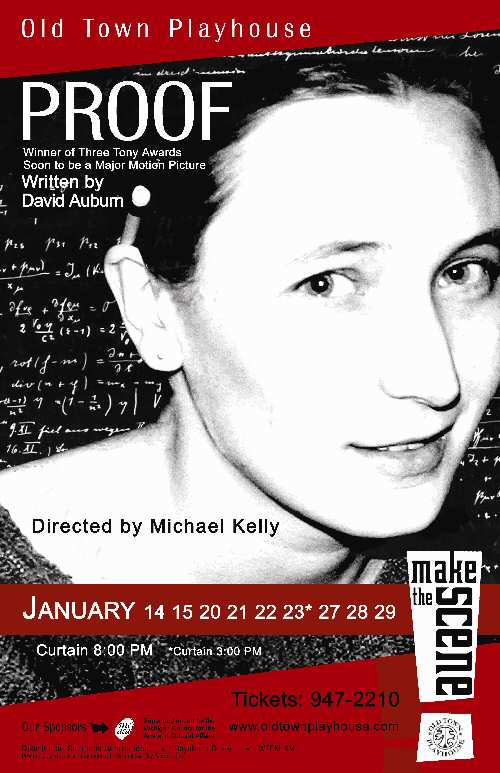

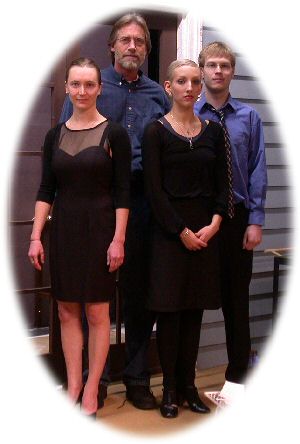
 |
 |
 |
Cast robert ............................. gary bolton catherine .....................danielle correll claire.............................. grace brauer hal ...............................chris horvath
|
|
 |
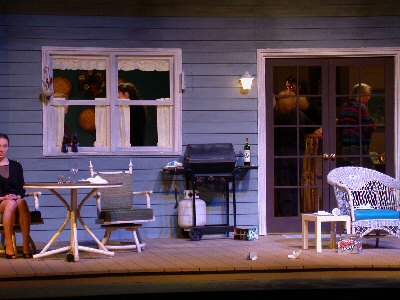 |
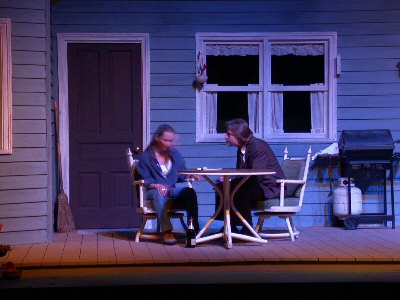 |
 |
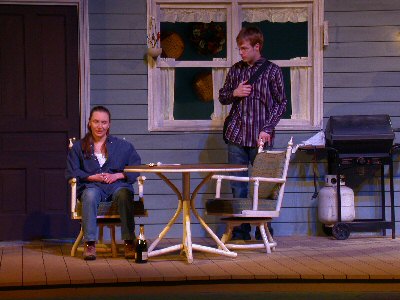 |
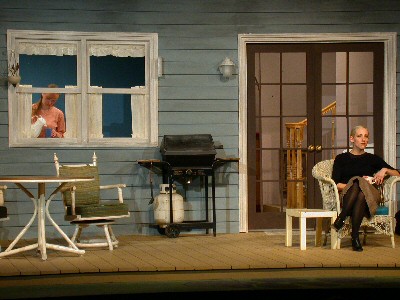 |
 |
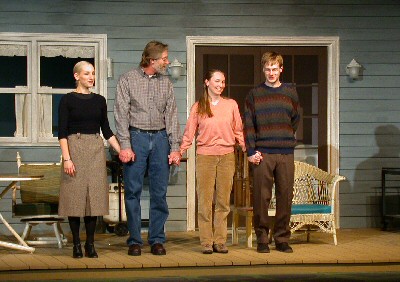 |
 |
Review,Nancy Sundstrom, Record Eagle. Jan. 19,2005
OTP shows "Proof" it can take on complex themes
NANCY SUNDSTROM, Special to the Record-Eagle
Over the past decade, a string of remarkable plays have been written with one word titles that revolved around high concept thinking.
Many credit Tom Stoppard's "Arcadia" with starting the trend. Others that followed that were embraced by theater critics and patrons alike included Yasmina Reza's "Art," Michael Frayn's "Copenhagen" and Margaret Edson's "Wit."
"Proof" is one of the most recent of this impressive group, and playwright David Auburn won a Pulitzer Prize for the effort. The show also won a 2001 Tony Award.
Now Old Town Playhouse in Traverse City has taken on this challenging, provocative play with director Mike Kelly leading a capable cast of four.
"Proof" is the story of Catherine'(played by Danielle Correll), the depressed daughter of a near genius mathematics professor, Robert (Gary Bolton), and her struggle to care for him during a debilitating breakdown he suffers in his final years.
Catherine has inherited his intellectual gifts, and quite possibly his mental illness. It intertwines their lives in a way that her composed, officious sister, Claire (Grace Brauer), and Robert's earnest young math protege, Hal (Chris Horvath) can barely comprehend. Robert's death leaves a trail of unanswered questions for them all that eventually leads to a notebook with a proof that is the equivalent of Einstein's Theory of Relativity.
At the core of the show is doubt. Robert doubts himself as his illness worsens. Catherine doubts herself on every level of emotional stability. Claire doubts Catherine being able to take care of herself, just as Catherine doubted the same for Robert. Eager, gentle Hal doubts that Catherine can commit herself to a blossoming relationshship. Both Claire and Hal doubt that Catherine actually wrote the mysterious proof.
The play revolves around Catherine requiring Correll to do most of the drama's heavy lifting. She is engaging and credible on nearly every front. Only her portrayal of a depressed person whose grieving has rendered her incapable of working lacks depth, and she gets no help from the play's often frenetic blocking, which has characters abruptly moving about at awkward points. Still, Correll gets about everything else right, delivering Catherine as complex with equal parts fierce intelligence and sensuality.
Bolton turns in a low key yet solid performance as Robert, effectively conveying the quiet torment of a man who knows he is losing his greatest asset, his mind. The beautifully written, opening scene of him and Catherine celebrating her birthday reveals a comfortable, natural chemistry, between the two.
Excellent performances are turned in by Brauer and Horvath, too. Brauer delivers the goods as the imperious, take charge sister. Like Correll, Brauer has crafted a textured character.
As Hal, Horvath never misses a beat. His is the character who shows the most growth over the course of the play, and Horvath's measured, slightly bumbling and charming portrayal, is truly one of this show's assets.
Director Kelly has helmed a show with the kind of dramatic substance that actors dream of getting their hands on, and their characterizations reflect attention to detail. Friday night's opening performance revealed some slow placing, particularly in scene changes, but that will no doubt smooth itself out as the run progresses. The show has strong production values, most notably in the effective set and lighting design by Ron Murden, and sound design by Wizard Roush.
Kudos to OTP for tackling another new work with mature themes about the nature of intelligence and emotions. In this latest vehicle, they provide "Proof" that they can raise the bar for actors and audience alike - not only entertain us, but make us think.
Performances for "Proof" are Jan. 20-22 and 27-29 at 8 p.m., with a 3 p.m. matinee on Jan. 23. For ticket reservations, call 947-2443.
The show contains mature themes and profane language.
Nancy Sundstrom is a director and performer who has been reviewing professional and amateur entertainment for the past 15 years
Winner of the Pulitzer Prize for drama, and one of the most acclaimed plays of the 1999-2000 Broadway season, Proof is a work that explores the unknowability of love as much as it does the mysteries of science.
It focuses on Catherine, a young woman who has spent years caring for her father, Robert, a brilliant mathematician in his youth who was later unable to function without her help. His death has brought into her midst both her sister, Claire, who wants to take Catherine back to New York with her, and Hal, a former student of Catherine's father who hopes to find some hint of Robert's genius among his incoherent scribblings. The passion that Hal feels for math both moves and angers Catherine, who, in her exhaustion, is torn between missing her father and resenting the great sacrifices she made for him. For Catherine has inherited at least a part of her father's brilliance -- and perhaps some of his instability as well. As she and Hal become attracted to each other, they push at the edges of each other's knowledge, considering not only the unpredictability of genius but also the human instinct toward love and trust.
This is first and foremost a family drama that only uses the discovery of a groundbreaking mathematical formula as its trigger. It does not require mathematical knowledge, and the author works hard to stay away from in-depth scientific references, thereby keeping the family drama front and center.
Direction by: Mike Kelly
2 Men ( 50s+ and 20 something)
2 Women (20 something and 30 something).
These ages could skew older if necessary.

Copies of the script are available at the Old Town Playhouse, and may be borrowed in your name with a $5 security deposit.